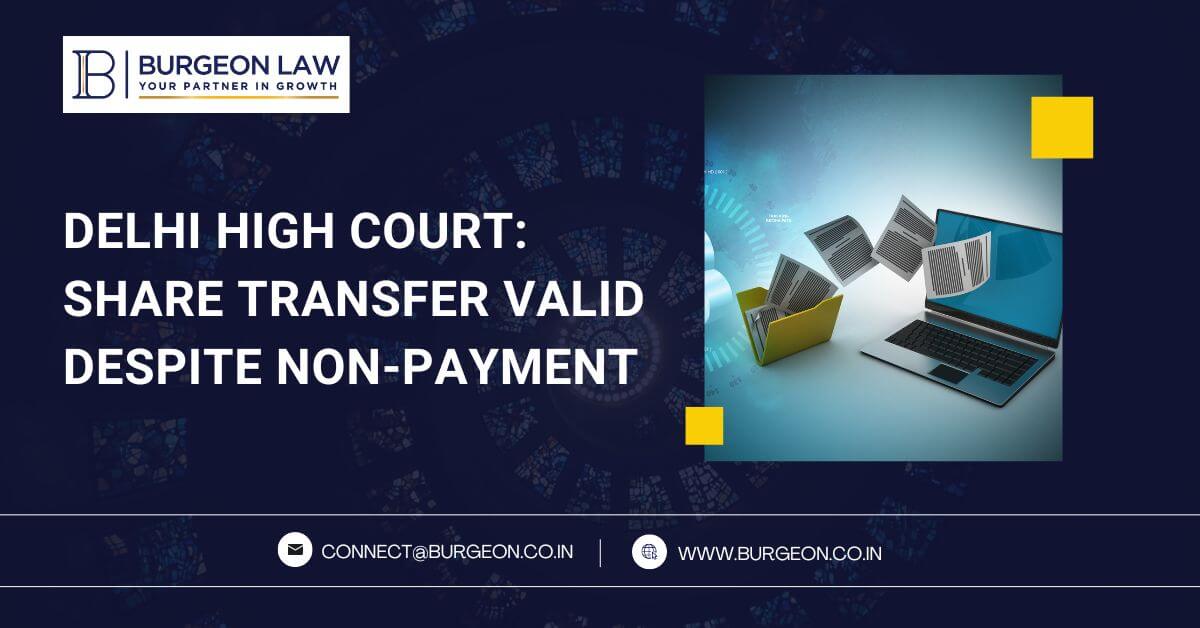Title to shares cannot be challenged on account of non- payment of consideration where share transfer form is validly executed and the transferee’s name is recorded in the register of members: Delhi High Court
Table of Contents
ToggleIntroduction
In a judgement passed by the Delhi High Court on December 15, 2023, in the case of Shashwant Nakrani vs. Ashneer Grover, the Court held that a share transfer form acts as a “document of title to goods” and once it is executed and the transferee’s name is recorded in the register of members, then the inexorable conclusion is that the title of the shares has passed and the delivery of the shares has taken place. Therefore, the share transfer is then complete.
Brief Facts
The plaintiff, being one of the founders of Resilient Innovation Private Limited (the “Company”), had transferred to the defendant 2,447 equity shares in the Company against the purchase consideration of INR 24,470. The plaintiff and the defendant had executed a share transfer form and thereafter, the Company entered the defendant’s name into the register of members of the Company.
However, the plaintiff alleged that he did not receive the purchase consideration from the defendant by any mode, and since the purchase consideration was not paid, the title in the plaintiff’s shares did not pass on to the defendant. Consequently, the plaintiff purported to: (a) treat the aforesaid share transfer transaction as invalid; (b) claimed ownership of the shares; and restrain the defendant from alienating, transferring or creating any encumbrance on the disputed shares.
Key Issue
Whether, in light of the provisions of the Sale of Goods Act, 1930 (“Sale of Goods Act”) and the subsequent conduct of the parties, title in the concerned shares passed from the plaintiff in favour of the defendant despite non-payment of consideration?
Judgement
The Court, while dismissing the plea of the plaintiff, held as follows:
- The information which is incorporated in Form SH-4 and the entry of the defendant in Form MGT-1 as a shareholder in the register of members, was pursuant to a statutorily recognized process. Therefore, there can be no presumption against the validity of the transfer in favour of the defendant pursuant to a statutorily mandated process.
- The subsequent conduct of the parties pursuant to the transfer is also of vital importance in the above case in as much as after the transfer was effectuated in favour of the defendant, in the ensuing years, a series of agreements (16 in number) were entered into wherein the plaintiff and the defendant sold their shareholdings to external investors.
- Further, the court has rejected the plaintiff’s contention that the title in the concerned shares never passed to the defendant on account of non-payment of consideration, in as much as the same is contrary to the provisions of the Sale of Goods Act, by observing as follows:
- A. The title in goods (which include shares) is transferred from the seller to the buyer only on sale of goods. The contract of sale of goods involves: (i) transfer of property in the goods to the buyer; and (ii) payment of price/consideration by the buyer to the seller. Necessarily, these are two ingredients of every contract/agreement for sale of goods.
- B. However, the validity or existence of a valid contract for sale of goods (shares) is not dispelled merely on account of the fact that time of payment of price or the time of delivery of the goods is postponed.

